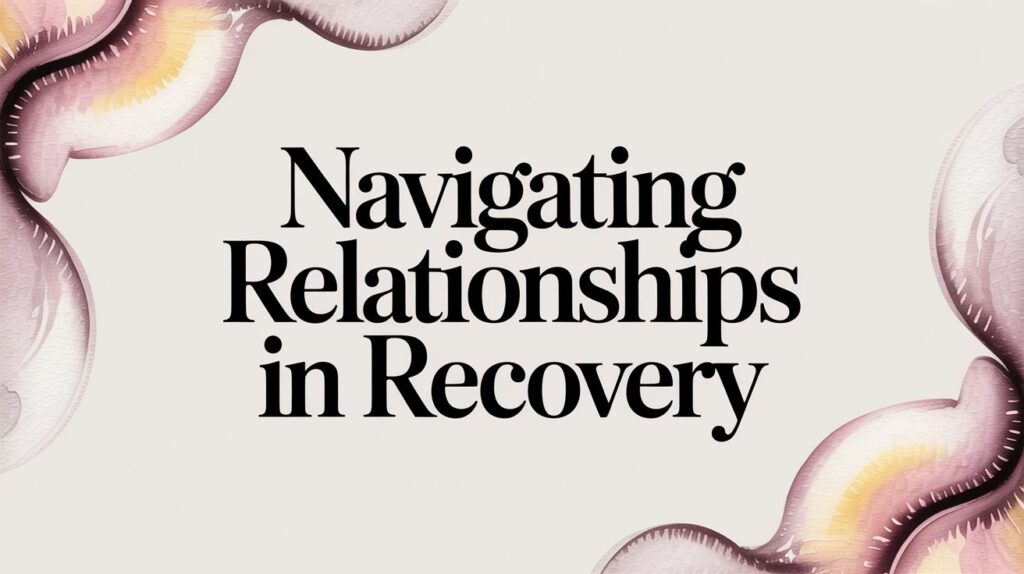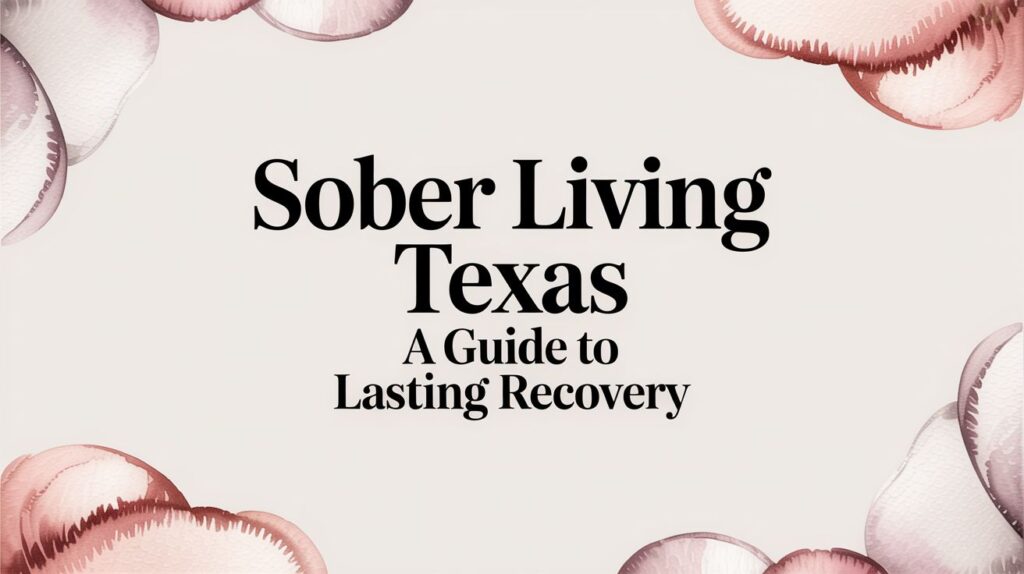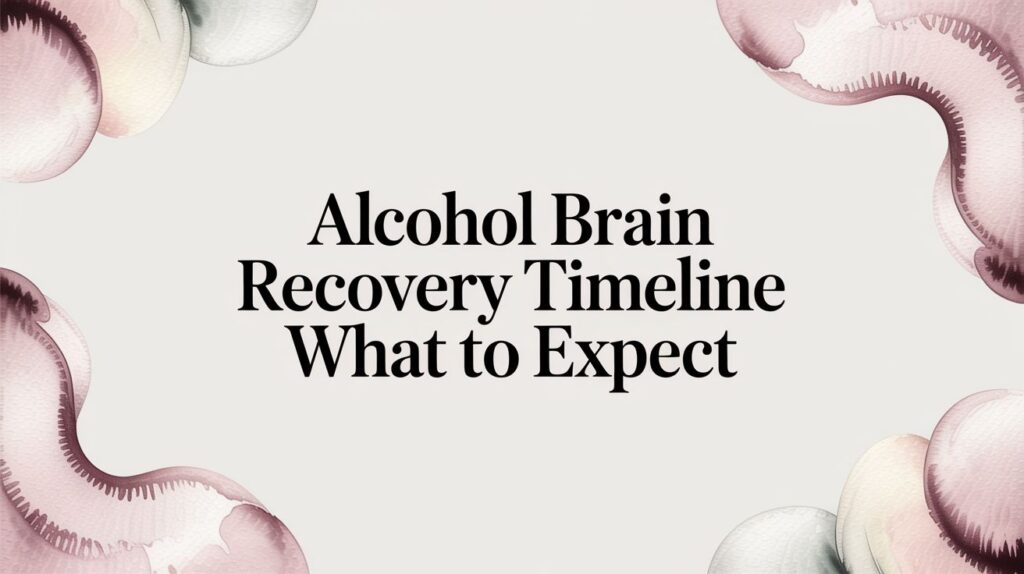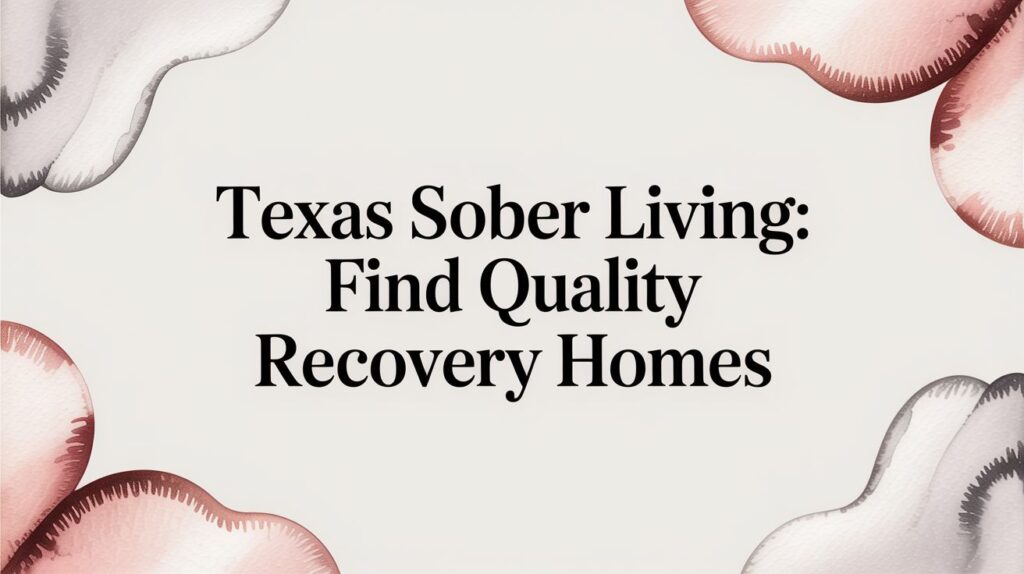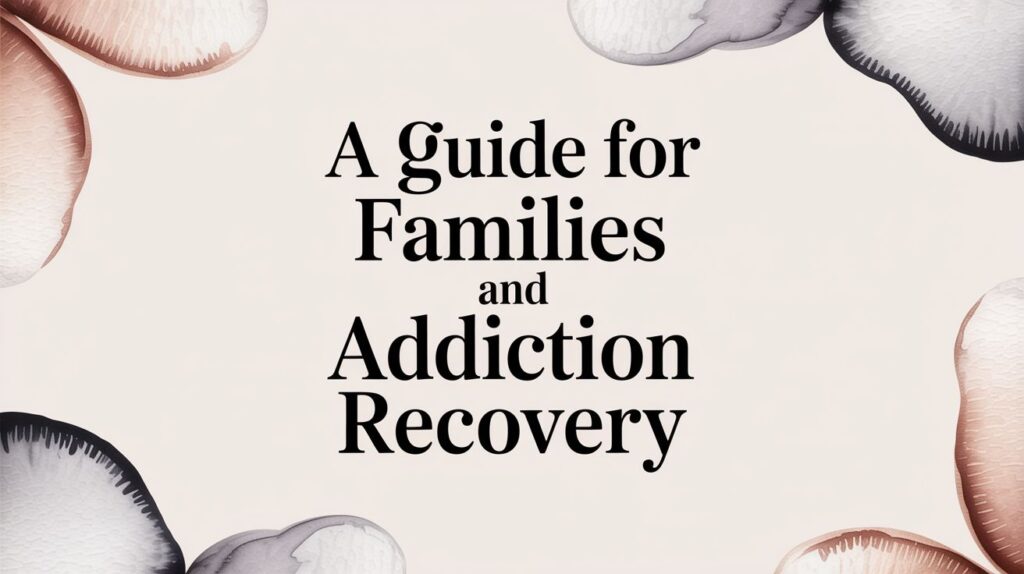When you first hear "spirituality in recovery," it’s easy to picture strict rules or religious services. But that's not what we're talking about here.
The reality is far more personal and practical. Think of spirituality less as a destination with a single map and more like your own internal compass—a tool you build to navigate the often-turbulent journey of sobriety. It’s about discovering what gives you hope, strength, and a sense of purpose beyond simply not using.
What Spirituality in Recovery Really Means
This journey is completely separate from organized religion. For some, a higher power might be a traditional God. For many others, it’s found in the quiet strength of a forest, the unwavering support of a recovery group, or the resilience they discover within themselves.
The core idea is connection: moving from the isolation that addiction thrives on to a feeling of being part of something bigger than your own struggles.
Finding Your Personal Compass
At its heart, spirituality in recovery often involves embracing the root cause method for self-healing and inner work. It's about digging a little deeper to find lasting peace instead of just patching over the symptoms. This means finally asking the big questions that addiction so often silences:
- Who am I without my substance? It’s about rediscovering your core identity and values.
- What is my purpose? It’s about finding a reason to get up in the morning that truly inspires you.
- How can I find peace? It’s about learning to sit with yourself and manage internal turmoil without needing something external to numb it.
This process of self-discovery is a crucial part of healing. It involves practices like forgiveness (for yourself and others), finding gratitude in small moments, and committing to honest self-reflection. These aren’t just abstract concepts; they are practical tools for building emotional sobriety. For instance, a detailed self-assessment can be a powerful spiritual tool, and you can see what that looks like in these 4th step inventory examples.
Spirituality is the practice of finding an anchor in the storm. When cravings, regret, or fear feel overwhelming, your spiritual foundation is what holds you steady, reminding you of your strength and purpose.
A Widely Recognized Path to Healing
The power of this inner work isn’t just anecdotal; it's a huge factor in successful, long-term recovery. In the United States, where millions of people are navigating substance use disorders, the role of spirituality is widely recognized.
A 2011 survey revealed that 55% of U.S. citizens believe spirituality is important for recovery, putting it right alongside formal treatment in terms of perceived value. This widespread belief underscores a simple truth: spiritual practices provide essential coping strategies and a supportive framework that helps sustain sobriety for the long haul.
Ultimately, embracing spirituality in recovery means you don't have to walk the path alone or without direction. It equips you with a personal compass, offering guidance, hope, and a profound sense of inner peace that empowers you to build a resilient, sober life.
The Real Benefits of a Spiritual Approach
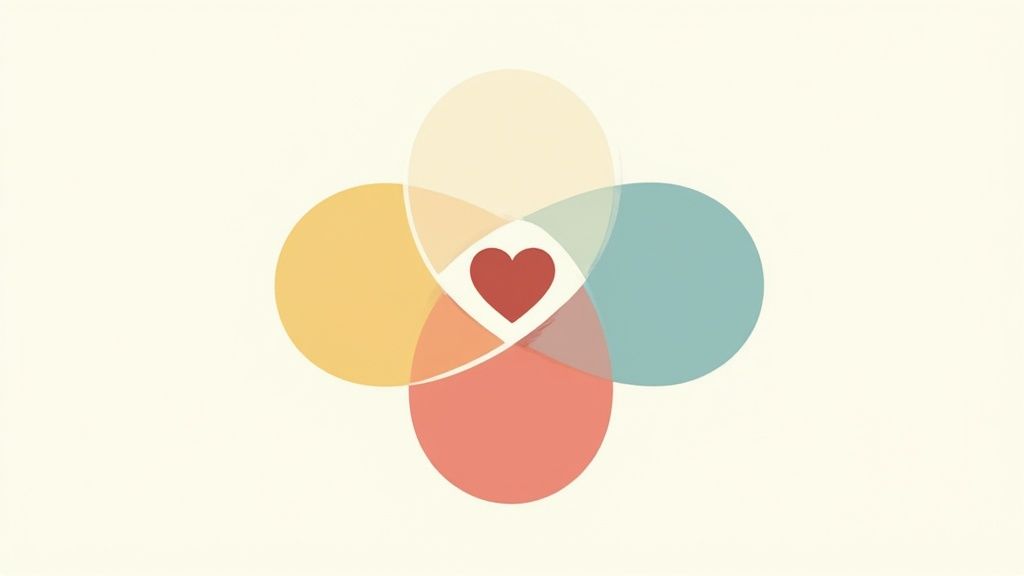
Let’s move past the abstract and get down to what this really does for you. The benefits of weaving spirituality into recovery aren’t just warm, fuzzy feelings—they are real, measurable changes that can fortify your sobriety for the long haul.
Think of these practices as powerful tools in your toolkit. When you engage in something like mindfulness or meditation, you're not just relaxing; you're actively training your brain and body to hit the brakes on stress. This calms the nervous system, lowers cortisol levels, and creates an inner quiet that’s the complete opposite of the chaos of active addiction. It’s an active rewiring of your internal alarm system.
Rewiring the Brain for Peace and Resilience
Science is catching up to what people in recovery have known for decades: spiritual practices literally change your brain for the better. Consistent mindfulness strengthens the neural pathways tied to self-control and emotional balance. Imagine building a new muscle in your brain, one dedicated to pausing before reacting.
Brain scans of regular meditators show increased activity in the prefrontal cortex—the brain's command center. This is the part responsible for focus and managing emotional impulses. By strengthening it, you’re better equipped to handle a trigger with a thoughtful choice instead of falling back into an old, destructive habit.
This means a spiritual practice can directly counteract the neurological damage of addiction, helping to heal the very parts of the brain that substance use hijacked.
Cultivating a Powerful Sense of Purpose
Addiction hollows you out. Life shrinks down to a miserable cycle of using and recovering, leaving a void where meaning used to be. Spirituality tackles this head-on by helping you reconnect with what truly matters to you. It helps you find a reason to stay sober that comes from deep within.
This renewed sense of purpose is like a shield against hopelessness. When you feel connected to something bigger than yourself—whether that’s a community, nature, or a personal mission—the daily grind of recovery doesn’t seem so overwhelming. You're not just running from something negative anymore; you're running toward a positive, meaningful life.
A study from the National Institute on Drug Abuse found that individuals with strong spiritual beliefs were significantly less likely to relapse. The takeaway is clear: purpose is powerful relapse prevention.
Strengthening Emotional and Social Health
Spirituality also builds the emotional skills you need to stay sober. Practices like gratitude, forgiveness, and self-compassion are the antidote to the shame and resentment that fuel addiction. Learning to forgive yourself and others lifts an enormous emotional weight that can otherwise drag you back to using.
Plus, spiritual paths often lead you to a supportive community. Whether it’s a 12-step meeting, a meditation group, or a church, connecting with people on the same path is priceless. These bonds fight the profound isolation that addiction thrives on. Healthy connections are so crucial, in fact, that understanding the dynamics of recovery and relationships is a key part of the healing process.
Ultimately, these benefits don’t work in isolation. They weave together to create a powerful support system for your mind, body, and spirit—healing you as a whole person.
Finding Your Own Spiritual Path to Sobriety
One of the most freeing things about bringing spirituality into recovery is that there’s no mandatory, one-size-fits-all approach. This isn't about squeezing into a box that doesn't fit. It's about finding what truly clicks with your own values and deepest beliefs.
Think of it like finding a form of exercise you actually enjoy. Some people love the energy of a packed spin class, while others find their peace on a quiet solo run. Both paths lead to better health. In the same way, your spiritual practice should be a source of strength you look forward to, not another chore on your to-do list.
Exploring Diverse Spiritual Pathways
The world of spirituality is incredibly broad, with room for everyone—from those with a traditional belief in God to atheists and agnostics. The only requirement is an open mind and a little curiosity to see what might work for you.
Here are a few of the most common pathways people explore:
- 12-Step Programs: Groups like Alcoholics Anonymous (AA) and Narcotics Anonymous (NA) are grounded in spiritual principles. The concept of a "Higher Power" is intentionally left open for interpretation. For some, it’s God. For others, it’s the universe, the collective wisdom of the group, or even an acronym like "Good Orderly Direction."
- Mindfulness-Based Approaches: Programs like Refuge Recovery lean on Buddhist principles like mindfulness and meditation to guide healing. This path is non-theistic, meaning it doesn't require belief in an external deity. Instead, the focus is on building awareness, compassion, and inner wisdom to handle cravings and emotional pain.
- Cognitive and Self-Empowerment Models: SMART Recovery (Self-Management and Recovery Training) offers a secular alternative built on self-empowerment and logic. While it's not spiritual in the traditional sense, its focus on finding a deeper purpose and mastering your own thought patterns absolutely aligns with the goal of building a meaningful, sober life.
For a lot of people, digging into different addiction recovery topics in groups is the perfect way to get exposed to these different frameworks. Finding the right community can make all the difference.
Finding Spirituality Beyond Formal Programs
You don't need to attend a single meeting to have a rich spiritual life. Many people find a profound sense of connection through personal practices they weave into the fabric of their daily routines.
This can be anything that helps you feel tethered to something larger than your own anxieties and cravings.
- Connecting with Nature: Taking a quiet hike, sitting by the ocean, or even just paying attention to the trees in a park can spark a powerful feeling of awe and put your problems into perspective.
- Creative Expression: Picking up a guitar, a paintbrush, or a journal can be a deeply spiritual act. It’s a way to process emotions that are too big for words and connect with your authentic self.
- Acts of Service: Volunteering your time or helping someone out shifts the focus away from your own struggles. It fosters a genuine sense of purpose and reminds you that you're part of a larger community.
The best spiritual practice is the one you actually do. A simple, five-minute gratitude list you stick with every day is far more powerful than an hour-long meditation you only get to once a month.
The infographic below drives this point home. It shows how even brief, but consistent, mindfulness practice can have a major impact on stress—a huge trigger in early recovery.
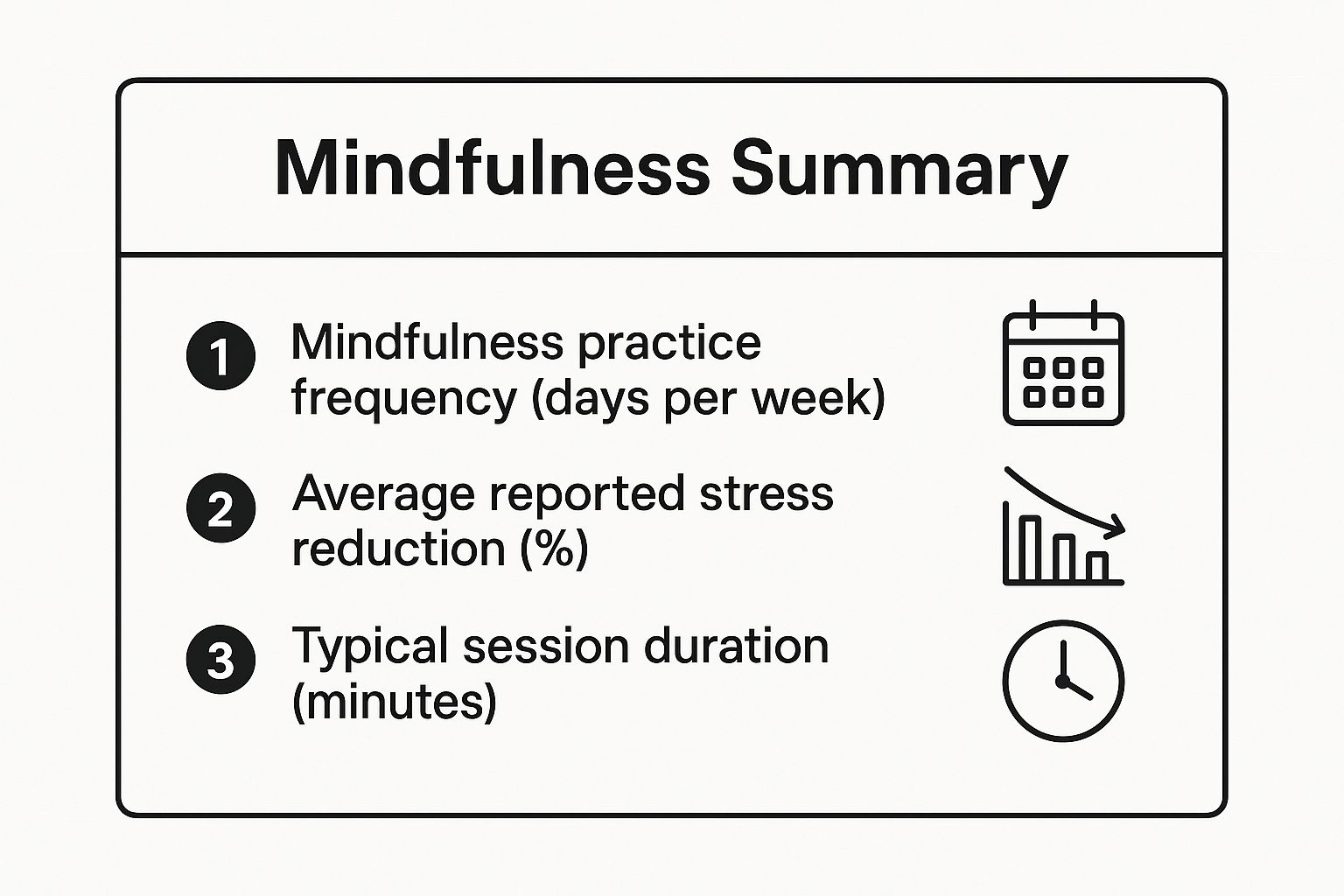
As you can see, consistency beats duration. This makes it so much easier to build a spiritual routine that feels manageable, not overwhelming.
Comparing Spiritual Pathways in Recovery
To help you get a feel for the options, the table below breaks down a few different approaches. This chart outlines different spiritual and mindfulness-based approaches to recovery, helping you find a path that aligns with your personal beliefs and needs.
| Recovery Path | Core Philosophy | Key Practices | Best For Individuals Who… |
|---|---|---|---|
| 12-Step Programs | Surrender to a Higher Power and work a set of spiritual principles with strong community support. | Attending meetings, working with a sponsor, self-inventory, making amends, prayer/meditation. | Seek structured community support and are comfortable with the concept of a self-defined Higher Power. |
| Refuge Recovery | Use Buddhist teachings of mindfulness and compassion to overcome the suffering of addiction. | Guided meditations, group discussions based on Buddhist principles, and self-inquiry. | Are interested in non-theistic, mindfulness-based practices and a path of self-awareness. |
| Nature-Based Spirituality | Find healing, connection, and perspective by immersing oneself in the natural world. | Hiking, journaling outdoors, mindful walks, gardening, or simply spending quiet time in a park. | Feel disconnected in urban environments and find peace, awe, and a sense of belonging in nature. |
| Creative Expression | Use artistic pursuits to process emotions, find meaning, and connect with one's inner spirit. | Painting, playing an instrument, writing poetry or journaling, and dance or movement. | Are naturally creative and find it easier to express complex feelings through art rather than words. |
Remember, you don’t have to pick just one. Many people pull practices from several different paths to create a custom-fit approach that works for them.
Ultimately, finding your spiritual path is a journey of self-discovery. Be patient with yourself, stay curious, and listen to your intuition. The right path is simply the one that brings you a sense of peace, purpose, and a stronger foundation for the sober life you deserve.
Weaving Spirituality into Your Daily Life
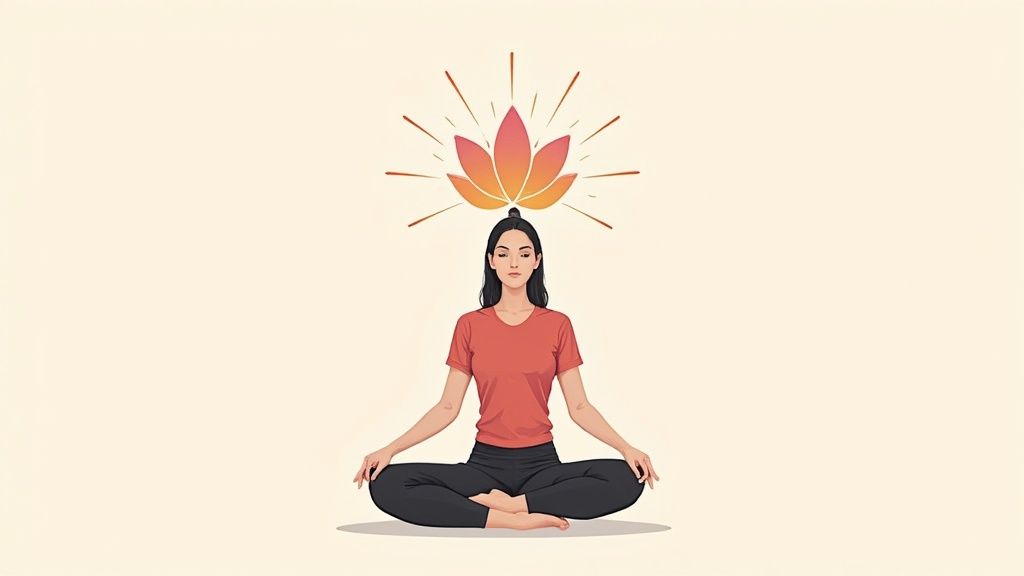
Knowing that spirituality in recovery is powerful is one thing. Actually living it day-to-day is something else entirely. The goal here isn’t to pile another stressful task onto your to-do list. It’s about weaving small, intentional moments of connection into the very fabric of your life.
Think of it like building a muscle. You wouldn't walk into a gym for the first time and try to lift the heaviest weight. You’d start with small, consistent reps, building strength gradually over time. Your spiritual practice works the exact same way—it’s built one quiet, intentional moment at a time.
These small actions are the real building blocks of a strong spiritual foundation. They don’t demand hours of your time, just a willingness to pause, breathe, and connect.
Start Your Day with Intention
How you start your morning can set the tone for the next sixteen hours. Instead of grabbing your phone and letting the world’s chaos rush in, try carving out just two minutes for yourself. This simple act reclaims your focus and grounds you before the day’s challenges even begin.
This isn’t about some complicated, rigid ritual. It’s about creating a tiny pocket of peace that belongs only to you.
A simple morning routine could look like this:
- A Two-Minute Gratitude Practice: Before your feet even hit the floor, name three specific things you're grateful for. It could be as simple as the warmth of your bed, the sound of birds outside, or just the gift of a fresh start. This practice actively shifts your brain’s default setting from what’s missing to what’s present.
- Setting a Daily Intention: Ask yourself, "What do I need most today?" or "How do I want to show up in my recovery?" Maybe the answer is patience. Maybe it’s honesty. Maybe it’s just staying present in this moment. This gives your day a clear sense of purpose.
This small investment of time pays off with huge dividends in emotional stability and resilience. It's your first spiritual act of the day, reinforcing your commitment to a whole new way of living.
Finding Spirituality in Ordinary Moments
You don’t need a special cushion or a silent sanctuary to connect with your spiritual side. In fact, the most powerful opportunities often show up right in the middle of everyday life—especially during moments of stress, frustration, or discomfort. The trick is to learn how to transform a reactive moment into a reflective one.
For example, when a craving hits, your old programming might be to panic or immediately seek a distraction. A spiritual approach invites you to simply pause and breathe. This doesn't mean you ignore the craving; it means you meet it with awareness instead of fear.
Mindful Breathing for Cravings: When you feel a trigger, just stop what you're doing. Close your eyes if you can. Take a slow, deep breath in for four counts, hold it for four, and then exhale slowly for six. Focus only on the sensation of your breath moving in and out. This simple action interrupts the brain's panic signal, giving you the space to choose your next move wisely.
This technique is an incredibly practical tool for real-time challenges. It connects you back to your body and your inner strength, reminding you that you are in control—not the craving.
Actionable Steps for Daily Connection
Integrating spirituality is all about finding what resonates with you and turning it into a habit. Consistency will always trump perfection. Try picking one or two of these simple practices and weaving them into your routine.
- Take a Tech-Free Walk in Nature: Leave your phone at home and just go for a 15-minute walk. Pay attention to the details—the feeling of the breeze on your skin, the exact color of the sky, the sound of your own footsteps. This practice helps you connect with something much larger than your own circling thoughts and anxieties.
- Journal to Process Emotions: You don't have to be a great writer. Just spend ten minutes getting your feelings out onto paper without any judgment. This simple act of externalizing your thoughts can bring incredible clarity and emotional release.
- Practice an Act of Service: Do something kind for someone else without expecting anything in return. It could be as small as holding a door, sending a supportive text to a friend, or truly listening when someone needs to talk. These actions shift your focus outward, chipping away at self-obsession and building a genuine sense of connection.
These practices build a reservoir of inner peace that you can draw from when life inevitably gets tough. And for family and friends, seeing a loved one adopt these new, healthy habits is a powerful and positive sign; understanding how to support someone in recovery can make all the difference on this journey. Each small action reinforces your commitment to healing and helps build a life rich with meaning and purpose.
Navigating Doubts and Spiritual Roadblocks

Let’s be honest: exploring spirituality in recovery is almost never a straight line. It's totally normal to hit rough patches, feel a wave of skepticism, or just wonder if you’re even doing it "right." These feelings aren’t a sign that you’re failing. They're part of the deal—and often, they’re opportunities to go deeper.
Many of us arrive in recovery with some heavy baggage. If you’ve had past experiences with organized religion that left you feeling judged, shamed, or pushed away, it makes perfect sense to be wary of anything labeled "spiritual."
The most important thing to remember is that spirituality and religion are not the same. You are in the driver's seat now. You get to define what this means for you, completely free from old rules or dogma that never felt right in the first place. This is about finding a source of strength that feels authentic to you.
Overcoming Cynicism and Skepticism
After the betrayals of active addiction, cynicism can feel like a necessary shield. You might be thinking, "How can I possibly believe in something I can't see, touch, or prove?" That’s a fair and common roadblock. The best way through it isn't to argue with yourself, but to shift from belief to action.
Forget about trying to force a belief. Instead, just commit to one small, concrete practice. You don't have to believe gratitude works to jot down one thing you're thankful for today. You don't need faith in anything to simply take a quiet walk and pay attention to the trees.
More often than not, a sense of connection or peace starts to bubble up from these small, consistent actions. Let the experience come first. Any beliefs can follow later, if and when they feel earned and real.
Questioning is not the opposite of spirituality; it's a vital part of it. A spiritual practice that can't withstand honest questions isn't strong enough for the challenges of long-term recovery.
Think of yourself as the lead researcher in the laboratory of your own recovery. Stay curious. Test different practices. See what happens.
Dealing with External Misunderstanding
Sometimes, the trickiest part of the journey is trying to explain it to other people. Friends and family might not get why you’re suddenly meditating, going to meetings, or talking about a "higher power." They might hear "spirituality" and immediately think of a specific religion, reacting based on their own baggage.
When you run into this, keep these points in your back pocket:
- You Don’t Owe Anyone an Explanation. Your recovery is yours. It's perfectly fine to just say, "This is helping me stay sober and feel more centered." End of story.
- Let Your Actions Do the Talking. The most convincing argument you can make is your own transformation. When people see you becoming calmer, more patient, and more present, the value of your practices becomes undeniable.
- Find Your People. This is critical. Surround yourself with a community that understands. Whether it’s a 12-step group, a meditation circle, or a good therapist, having people who are on a similar path makes all the difference.
Getting through these roadblocks takes patience and a whole lot of self-compassion. Give yourself permission to be a beginner, to have doubts, and to figure things out at your own pace. Every challenge you navigate strengthens your spiritual foundation, building a practice that can truly hold you up for the long haul.
The Role of Spirituality in Global Healing
The human drive for meaning, connection, and a sense of purpose isn't something that stops at a border. When we're navigating the challenges of recovery, this need becomes universal. Across the globe, societies have long understood that real healing from addiction isn't just about physical abstinence—it requires a deeper, spiritual restoration.
This isn't a new-age fad or a niche Western idea. It’s a powerful, cross-cultural truth that spirituality is a cornerstone of a resilient life. The practices might look different—from silent meditation in a monastery to a vibrant community ceremony—but the goal is identical. It’s all about reconnecting someone to their community, their values, and a sense of hope bigger than their personal struggle.
Understanding Recovery Capital on a Global Scale
One of the most useful concepts here is recovery capital. Think of it as the total wealth of resources a person can draw on to sustain their sobriety. And no, we're not just talking about money in the bank. This capital is a mix of personal and social assets that make long-term recovery possible.
It's built from a few key ingredients:
- Social Capital: This is your network. It’s the supportive family, friends, and peers in recovery who offer you encouragement and hold you accountable when you need it most.
- Human Capital: These are your internal resources—your skills, your health, your knowledge, and the self-worth that empowers you to face challenges head-on.
- Spiritual Capital: This is the big one. It’s the meaning, hope, and purpose you get from feeling connected to something greater than yourself.
Around the world, treatment models are finally catching on, recognizing that building this capital is just as critical as any clinical intervention. Spiritual engagement is a huge piece of this puzzle because it directly fuels hope and fosters community, strengthening a person's overall foundation for success.
A Worldwide Approach to Healing
This spiritual angle is crucial not just for substance use, but for behavioral addictions like gambling or internet addiction, too. An estimated 11% of the population worldwide grapples with these behavioral patterns. New research is highlighting just how critical 'recovery capital'—including social networks and spiritual engagement—is for fostering resilience and empowerment.
Treatment options for behavioral addictions are still scarce in many parts of the world, but this is where spiritual practices can step in to fill a vital gap. They help people work through the deep spiritual voids that often accompany these conditions, paving the way for sustained healing. If you want to dive deeper, you can read the full research about spirituality and behavioral addictions.
By recognizing spirituality as a cornerstone of healing across cultures, we validate its incredible power. It’s a shared human truth: finding purpose and connection is fundamental to overcoming adversity and building a life that truly feels meaningful.
Common Questions About Spirituality and Recovery
Talking about spirituality in recovery can bring up some tough, practical questions. It's an area where a lot of us carry baggage or skepticism. Let's tackle some of the most common concerns head-on so you can move forward with clarity and confidence.
Do I Have to Believe in God for This to Work?
Absolutely not. This is probably the biggest misconception out there. Spirituality in recovery is incredibly personal, and you are always in the driver's seat.
While some people find strength in a traditional "Higher Power," many others define this connection in ways that have nothing to do with religion.
For them, this power might be:
- The shared wisdom of the recovery community itself.
- The profound order and resilience of the natural world.
- The guiding principles of the universe.
- Their own deepest, wisest inner self.
There are entire recovery paths, like Refuge Recovery, built on non-theistic principles like mindfulness and inner strength. You get to define what this looks like for you. No one else.
How Is This Different from Just Being Religious?
Think of it this way: religion is often like a specific, organized roadmap. It has established routes, rules, and rituals that a whole community follows together. Spirituality, on the other hand, is the personal act of drawing your own map.
It's your individual journey to find meaning, a sense of purpose, and a connection to something larger than your immediate struggles. You can absolutely be both religious and spiritual. But many people in recovery find that spiritual practices—like meditation, spending time in nature, or keeping a gratitude journal—give them the strength they need without ever stepping into a formal religious structure.
The goal isn’t to adopt a rigid belief system. It's to cultivate a personal, inner experience that fuels your hope and resilience. It’s about what works for you.
What if I Feel Resistant or Cynical About It?
Welcome to the club. Feeling skeptical or resistant is a completely normal—and common—place to start. Many of us arrive with past negative experiences or just a healthy dose of cynicism.
Here’s the key: start with action, not belief.
Don't try to force yourself to believe anything that doesn't feel true. Instead, just experiment with a small, simple action that feels doable. For example, try writing down one single thing you're grateful for each morning. That’s it. Often, the practice itself starts to shift your perspective, and the positive feelings follow naturally, opening you up to the benefits over time.
At Altura Recovery, we know that every recovery path is unique. Our compassionate team is here to help you explore these deeper connections in a way that feels authentic, supportive, and right for you. If you’re ready for real healing and real growth, contact us today.


